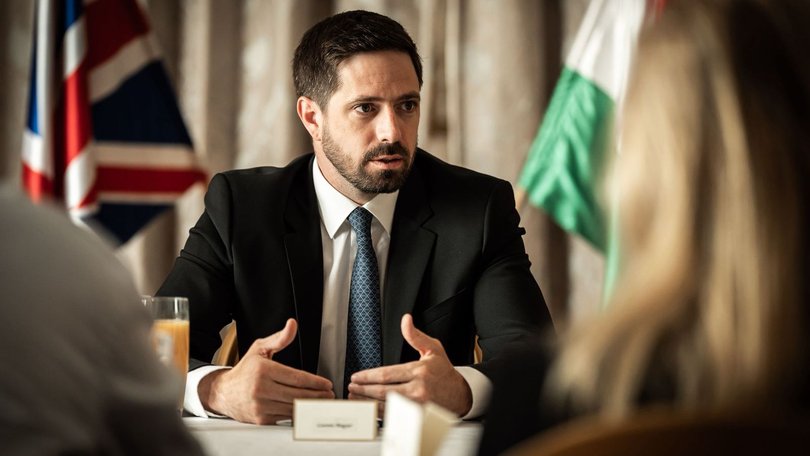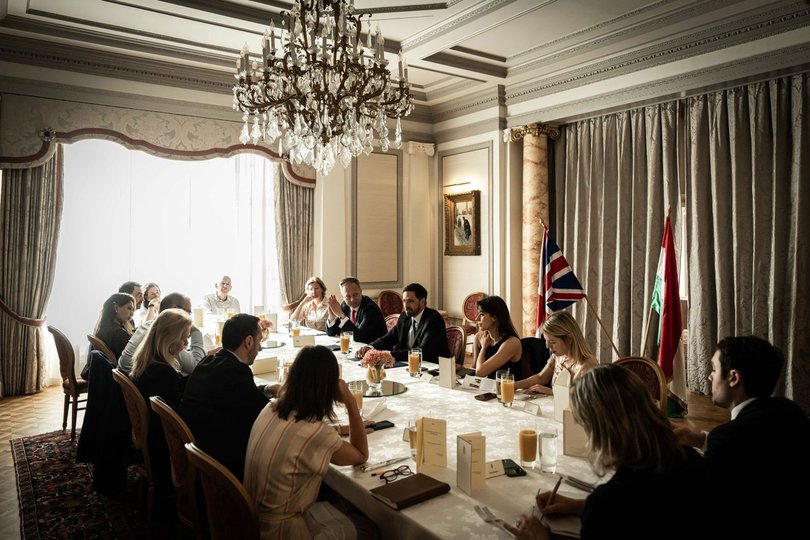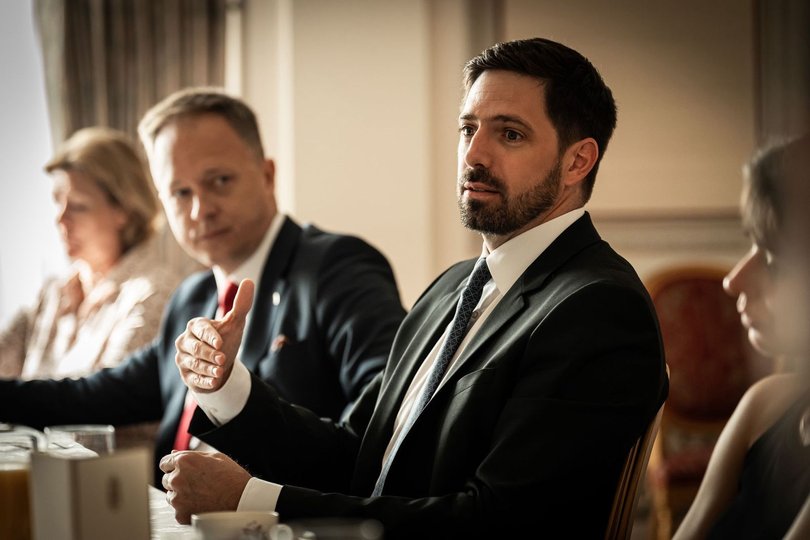Hungary says ‘novelty’ of Trump approach is gone as Russia-Ukraine war rages on
US President Donald Trump failed to end the Russia-Ukraine war in 24 hours, as he pledged to do during the presidential campaign – a claim he later revised as being ‘obviously sarcastic’.

The novelty of Donald Trump has worn off and the US President is not expected to deliver a ceasefire in Ukraine in the near future, one of Hungary’s top officials has said.
Deputy Foreign Minister Levente Magyar said Hungary, which borders on the Ukraine, doesn’t “see the conflict ending very soon” after having “high hopes for Trump”.
The thinly veiled criticism is significant as the country’s Prime Minister Viktor Orbán is a Trump-supporter but often takes positions that align with Russia, China and some parts of the MAGA movement.
Sign up to The Nightly's newsletters.
Get the first look at the digital newspaper, curated daily stories and breaking headlines delivered to your inbox.
By continuing you agree to our Terms and Privacy Policy.The US President has promised to make a big announcement on Ukraine on Monday after expressing growing frustration and anger with Russian President Vladimir Putin for refusing to end the war.
Mr Trump failed to end the war in 24 hours, as he pledged to do during the presidential campaign – a claim he later revised as being “obviously sarcastic”.
Mr Magyar made the remarks in a briefing to selected journalists in London.

“Look, we don’t see the conflict ending very soon,” Mr Magyar said.
“We had high hopes for Trump coming in and negotiating some kind of a ceasefire, if not a lasting peace.
“That has not come about, at least not in the time frame we were looking for.
“The novelty of the American approach, where it changed, is gone.
“I think that we’re in for a lot of more suffering and I wish that I would not be right.”
Ukraine’s President Volodymyr Zelenskyy has pressed President Trump for Patriot air defence systems, which Mr Trump has said could be funded by NATO.
NATO Secretary-General Mark Rutte will meet US President Donald Trump in Washington DC this week during a two-day visit.
Hungary opposes arming Ukraine and is one of the few European Union member states not to contribute weapons or funding to Kyiv, after Russia’s illegal and unprovoked invasion in 2022.
The Central European country is also a member of NATO and often plays spoiler inside the EU on sanctions against Russia.
Hungary has never formally used its voting power to veto imposing sanctions on Moscow.
It has also sought increased Chinese investment in Hungary, despite the EU urging a “derisking”.

Pressed by The Nightly whether this opposition to arming Ukraine also extended to China, fuelling Russia’s wartime economy and selling it goods and components that can be used in weapons to kill Ukrainians, Mr Magyar claimed not to know what China was selling Russia.
“Any measure, any step, any decision that furthers the warring parties’ abilities to sustain the war is undesirable and regrettable in our view,” he said.
“So we don’t want any foreign interference, any foreign aid in terms of military supplies going to either of the parties.”
China’s Foreign Minister Wang Yi made it clear to the European Union’s Kaja Kallas during a recent meeting in Brussels that China benefited from Russia being bogged down in Ukraine, as ending the conflict would free up the United States to pay more attention to the Indo-Pacific, according to a source in the room.
Asked whether Prime Minister Orbán was using his relationship with President Xi to encourage President Putin to the negotiating table, Mr Magyar said Hungary saw its economic relationship as separate from geopolitics.
“We distinguish between our bilateral economic partnership and their dealings, their great power politics and games that are going on between themselves in the world,” he said.
“I mean we can tell people what to do but it doesn’t mean that they’ll abide.
“We’ve been trying to communicate according to our actual influence.
“So we’re not gonna be calling on people what to do?”
Mr Magyar said Hungary, with a population of nine and a half million people, attracted around one-third of all Chinese direct investment into the European Union, despite accounting for 1 per cent of the EU’s overall economy.
Both NATO and the EU have accused China of enabling Russia’s war effort, which also spurred closer military cooperation between China, Iran, North Korea and Russia. North Korean troops have been fighting in Ukraine, something Mr Magyar said he was “appalled by.”
Hungary’s stance on Russia has put it in the firing line inside Europe.
Last year, when it held the European Union’s rotating presidency for six months, Prime Minister Orbán travelled to Russia on an unauthorised “peace mission”.
He has also allowed Chinese police to jointly patrol Hungary and eased visa restrictions on Russia and neighbouring Belarus, which is led by a Putin puppet Alexander Lukashenko.
Hungary actively disputes fears expressed by the Baltic states that Russia’s imperialism will extend beyond Ukraine if it is not defeated.
And it says there is no need to re-arm and increase defence budgets to 3.5 per cent of GDP, but said that it will meet the new NATO target.
Professor Kim Scheppele, who teaches international affairs at Princeton University and lived and worked in Hungary as a researcher at the Hungarian Constitution Court, said she was not surprised by Hungary’s repositioning on Mr Trump.
“Orbán wants to portray himself as the leader of the autocratic populist right in Europe, and this is more plausible if he’s the Trump-whisperer in the set,” she said.
“If Trump starts to deviate from Orbán’s line, this creates a crisis for Orbán.
“Orbán touted his close relationship with Trump during last year’s US presidential campaign and since the election – and Orbán has counted on Trump’s conception of “peace” aligning with Orbán’s, which is urging Ukraine to simply give up and accept that Russia is the more powerful country.
“Now that Trump seems to be wavering in that view, Orbán is a loner within EU and NATO circles.
“Orbán’s spokespeople need to defend Orbán’s views without slighting Trump – hence the explanation that their economic relationship is separate from geopolitical agreement.
“This explanation also covers potential tension over China, where Trump is doubling down on tariffs, considering further economic penalties, but where Orbán is taking all of the foreign direct investment he can get.
Bryce Wakefield, CEO of the Australian Institute for International Affairs, said Hungary was walking a fine line between nationalism, closer ties with Russia, whilst at the same time preserving EU funding.
“Orban, along with Slovakia’s Robert Fico, will continue to be the European leader most sympathetic to the MAGA cause,” Dr Wakefield said.
“However, the longer Trump continues to engage Putin on Ukraine without deliverables, the more Budapest will be uncomfortable giving Washington a blank cheque.”

